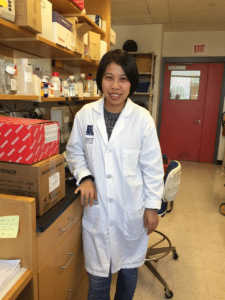 What else are you working on?
What else are you working on?
My big interest is how maternal peanut allergy status affects a child’s immune system in regards to the development of peanut allergy.
Clinical observational studies have shown that a mother having allergies increases the chance of a child developing peanut allergies, although the exact reason for this is unknown. We did four years of research in mice on this subject. We made a mouse allergic to peanut and then examined the effects on allergy in the next generation.
We found that something called “DNA methylation”, which is altered when the mouse has a peanut allergy, was already altered in the offspring when they were born. This can go on to cause allergic disease. We will need to verify this finding in humans.
What are the next steps in that research?
This ability to influence DNA methylation status provides an opportunity to reverse the allergy process. If we could somehow correct the epigenetic alteration in the first generation of allergy so this high risk of allergy can not be transferred to the second generation, then we may be able to stop the allergy from developing in the first place. This is my big hope.
What is your lab like?
We take up about a third of the space in a really big lab shared with Dr. Hugh Sampson. You can see at least six fellows and a number of students working in our area at a given time. We have lab meetings every week with Dr. Li. We also have our pediatric allergy division lab meetings under the direction of Dr. Sampson and Dr. Scott Sicherer. That’s where we present our research findings and people can discuss and make suggestions and comments. It’s a very supportive scientific environment.
Are you involved in research on human patients?
Yes, I am involved in human studies in several ways. One is related to FAHF-2 clinical trials. I am in charge of immunological studies that determine how cells respond to the Chinese herbal formula treatment. My second role is to study FAHF-2 and other Chinese herbal medicine extracts and compounds immuno-modulatory and anti-inflammatory effects on cultured cells from allergic patients and patients with inflammatory bowel disease.
Some of Dr. Li’s patients also give blood samples for the in vitro studies. We test cytokine and IgE production, basophil activation, and epigenetic changes, etc. I also work with medical students to organize case reporting from Dr. Li’s off-site clinic, which is where several potential beneficial effects of TCM therapy for food-allergic children have been observed. For example, prevention of frequent and potentially severe reactions, reduced IgE production.
This case study has just been published. I am working on more case reports from Dr. Li off-site clinic on other observed beneficial effects. Now, I’m looking forward to playing a major role in an upcoming biomarker study of TCM effects on polyallergen sensitization.
What are the next steps for studying traditional Chinese medicine in human patients?
We are proposing a new practice-based study. This study combines clinical practice and basic science to conduct a biomarker study of practice based TCM effects in polyallergen sensitization. The project has raised great interest among families whose children are patients from Dr. Li’s offsite clinic. They have begun fundraising, working with Mount Sinai Development Office, for this project. Our first target is $50,000. Once we reach the target, we’re going to start this new study where we can explore the immunological changes with the herbal treatment and how the people with severe food allergy respond to the herbal treatment.
What are some of the challenges you have with your research?
Funding, actually. NIH funding has been very difficult. Fortunately, we received substantial funds from private organizations and philanthropic support. We’re trying really hard to get more private funding and grants, including NIH grants, to continue our research.






